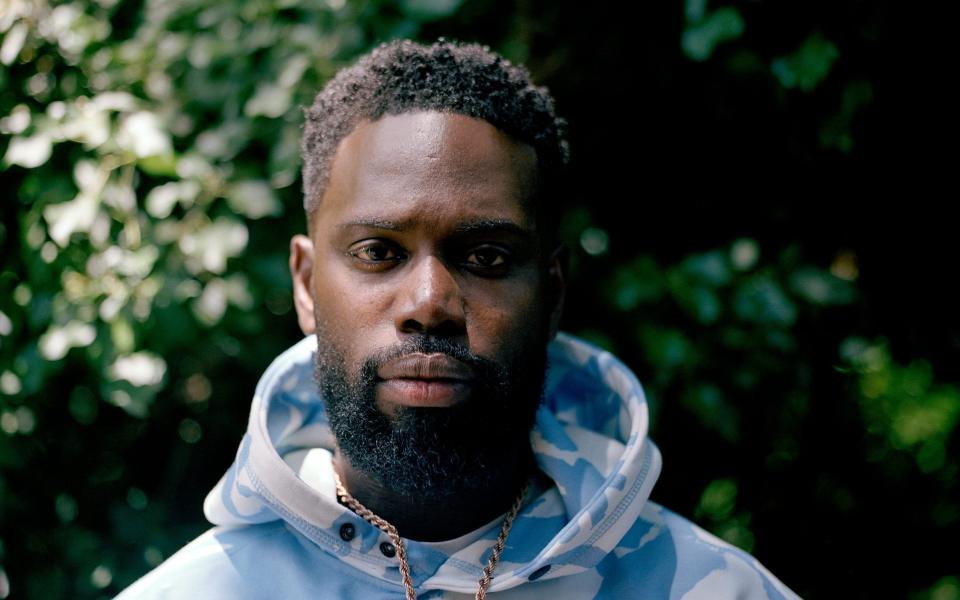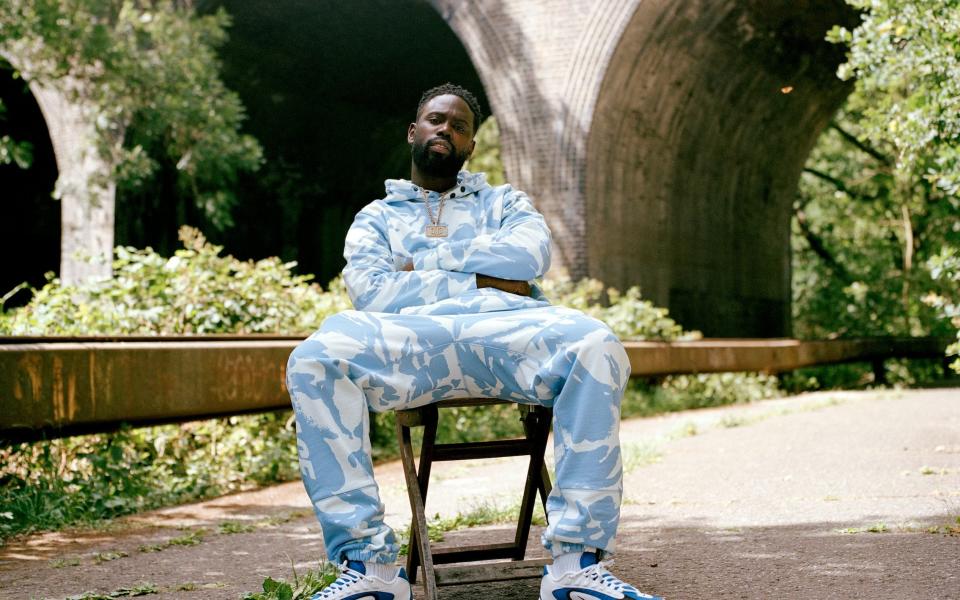‘Grime represents the start of a beautiful thing in Britain’: Ghetts on finally finding peace in music

The past year has been different for everyone. Even rappers. “Me and Mr. Google have become best friends,” says Ghetts, “I got asked something about long multiplication the other day and my head nearly exploded.” Homeschooling an eight-year-old might not be how he’d envisioned the run-up to releasing his strident third album, Conflict of Interest, but the Plaistow-born MC is taking it in his stride.
The album is his most polished yet. The title and cover art nod to his wrestle over the years with competing aspects of his identity and history: the angry, ostracised young man grappling with the responsibility that accompanies age and fatherhood. The lingering question: has he found his peace?
Ghetts, real name Justin Clarke, has been an instrumental figure in the UK’s grime scene for more than 15 years. Since leaving prison at the age of 19 and vowing never to return, music has been almost all that he’s known or done. He’ll be 37 this October, and says the past two weeks are the first in years that he won’t have spent every day in the studio. When lockdown hit last spring he built a recording space at home, which he says he didn’t end up using because he’d rather get out of the house and…go to the studio.
His days of, as he puts it, “bumps and scrapes” are now long behind him. “People don't understand what an accomplishment that is,” he says of the steps he took to remove himself from a life of petty crime. “I feel proud knowing that one day I told a guv that, ‘No I ain’t coming back, I’m going to do this, I’m going to do that.’ And I've done all of those things.”
He’s acutely aware of the difference a supportive family and music community invested in his talents have made to his life. In the video for Proud Family – a stirring highlight on the new album – two young men are seen leaving prison. One swaggers over to a group of his friends, who pop champagne and jump about under the spray. The other wears a smile of deep reassurance as he’s greeted by his mum and a hug.
In 2005, two years after he’d left prison and told the guv he’s never coming back, Ghetts released his explosive debut mixtape, 2000 & Life, under the name Ghetto – a moniker bestowed on him by the late grime and drum & bass MC Stormin. His original name, the rather on-the-nose ‘Freedom’, had failed to catch on. By this time, the sparky young MC had picked up some buzz. He’d appeared on Kano’s debut, now-classic album Home Sweet Home through their shared NASTY Crew connection, and toured with Mike Skinner at the height of The Streets’ fame.
After splitting with NASTY, Ghetts formed his own collective, called The Movement, alongside Wretch 32, Devlin, Scorcher, Mercston and a rotating cast of other rising MCs. The group filmed a DVD (a key distribution format within the scene at the time), recorded a mixtape that blended grime and US hip-hop beats, and laid down five ‘F*** Radio’ studio sets that saw a flurry of MCs trading white-hot bars. Ghetts’ rowdy, buck-toothed appearances on the Risky Roadz freestyle DVD series injected more hype.
A tendency to let his temper slip in more heated moments birthed one of the grime scene’s first and most-enduring memes (ask Carlos). His combination of fearless, full-tilt delivery and densely woven lyricism made him a match for anyone willing to test their mettle. He gobbled up opponents gladly.
The release of Ghetto Gospel in 2007 proved that Ghetts was capable of sustaining – and sometimes calming – this frantic energy across a full-length album. Tracks like Trapped In The System showed he could turn his sharp tongue to more contemplative topics – a talent he’s honed in recent years, writing intelligently about colourism, colonialism, and youth violence.
He dropped the Ghetto moniker in favour of Ghetts a few years after the release of Ghetto Gospel, and on 2013’s The Cypher he plays his three identities of Ghetto, Ghetts, and J. Clarke off against each other: uppity and aggressive versus articulate and angry, and finally J. Clarke’s smoother, more settled delivery. Has he reconciled these characters within himself now? “At this point, I think Justin, Ghetto, and Ghetts are working together instead of against each other,” he says, “It's more of a synergy.”
His aggressive posturing as Ghetto may have put off the major label suits swooping in to pluck from the cream of grime’s crop in the late 2000s (Tinchy Stryder, Skepta, Wiley, Chipmunk were among those to bag deals). A slot on X Factor contestant Cher Lloyd’s dismal Dub On The Track remains his only scar from that era. He laughs it off now, and says it gave him an invaluable insight into how the business worked.
Conflict of Interest marks Ghetts’ debut outing on a major imprint (the album is being released by Warner Records), and he says it felt like the right point in his career to enter into what he describes as “a partnership.” He laughs when he says he’s a nightmare to work with if you’re lazy, such is his perfectionism. After hiring in a string section to record a segment for one album track, he liked the sound so much that he booked players to record across the album – he wasn’t prepared to settle for anything less. This incessant drive to be the best comes out in one particular anecdote. He beams visibly while telling it.
“I watched Fade To Black [the 2004 documentary about] Jay-Z when I was very young, and there’s a session with him and Rick Rubin when he’s creating ’99 Problems’. And he doesn’t write [his lyrics down]. I remember thinking, ‘That’s impossible. That is not possible,’” says Ghetts. “But if the greatest rappers alive don’t write, then I’m not gonna write.” So, of course, he set about emulating the process for himself: starting with a couple of lines, then 16 bars, eventually able to string together verses and choruses without a pad or pen. “Nothing on this album was written,” he says, his pride pouring out from behind a wide smile.

This would be a less remarkable fact if it weren’t for the sheer depth, complexity, and verbosity of Ghetts’ lyrics. As a young MC, rivals would accuse him of spitting for too long, or obsessing over the technicality of his wordplay. Most of the tracks on Conflict of Interest sail over the four-minute mark (a couple go beyond six-and-a-half) and almost all are packed with rich storytelling and whipsmart one-liners. “Who would have thought back then/We'd be some powerful black men?/Back when we was in estates I was trapped in, trapping,” goes IC3, a song named after the police code for a black person. “Tell NME I think it’s funny they ignored us,” he spits wryly on Autobiography (the music mag has given this album five stars).
Autobiography is Conflict of Interest’s near-seven-minute opus; Ghetts walks the listener through his career to date, sparing no detail. Good Hearts throws back to smooth garage parties. Fire and Brimstone samples Dizzee Rascal’s classic Ice Rink freestyle from 2003. But despite all of this, Ghetts says he has no interest in marinating in nostalgia. “I am from a golden era in the UK of music making, but it can hold you back when you [just] rely on what you've done,” he says. “So I always look to the future. I’m not looking to recreate moments that have already happened, but have new moments that also mean so much to me.” On the strength of Conflict of Interest alone, it’s hard to deny his argument: it’s the first time he’s truly managed to meld his high-concept approach and energetic style.
Mozambique is an updated, more refined take on classic string-led Ghetto tracks like Top 3 Selected; opener Fine Wine wears the blunt metaphor of its title loosely, with Ghetts cooly leading the listener through his come-up to the present day. On Skengman and Crud the two biggest MCs in the UK, Stormzy and Giggs respectively, are pushed by Ghetts to perform at their peak over lurching rap and sprightly grime beats. Ed Sheeran (who cites Ghetts as a direct influence on his own approach to songwriting) has another spirited go at rapping on 10,000 Tears, while Ghetts sings the hook – the pair having first linked up on the No. 5 Collaborations EP back in 2011. Elsewhere, Emeli Sandé adds a dash of Radio 2 pop sheen on Sonya, a sax-assisted song about friendships lost to time.
Ghetts insisted that all the instrumentals used on the album were bespoke, rather than accepting ready-made beat packs from third-party producers. “It’s me looking at myself and saying, ‘You’re weird! Show the world you’re weird, bro! Don’t be scared of it, you’re an individual, your individual experiences are different, show them,” Ghetts says of this new, more expansive approach to music-making.
For Ghetts, his drive is almost existential. “I was releasing music before YouTube had even taken off,” he says, “so to still be around in this era, and still being able to make music and having people that are still into it, is a blessing in itself.” He says he doesn’t see much of grime’s old guard these days, but when they do link up (Giggs hosts the best events, apparently) there’s rarely time for reminiscing. He clearly feels a responsibility to the generation of MCs following behind him.
“We don't really speak about what was, more about what's going to be and and just navigating through these unsure times. Because, remember, we're in uncharted ground – a space where artists our age haven't existed at this level before.” Judged on chart position alone, the UK’s current rap landscape has never been healthier: multiple acts, including Nines, Fredo, AJ Tracey, Chip, and Headie One, have all set up camp in the top 10 over the past year.
Like many artists, Ghetts is keenly aware of the legacy his work will resemble when he’s no longer here. He still listens intently to old Michael Jackson albums and James Brown singles and marvels at what they were able to achieve. “I always think I can't be doing anything that's less than my best, for that reason,” he says. It’s taken years of perseverance. He remembers when grime was no longer the ‘hot’ sound, and the exodus that followed this change in fortune. But ultimately his own bets have paid off. “Grime represents, for me, it represents the start of a beautiful thing in Britain: making unapologetic music and being able to have a platform that has enabled us to do something that we love and also feed our families from,” he says. “It represents something beautiful as a culture.”
And then there’s the other element of his legacy. The one he’s been struggling to teach maths to. “What’s your favourite song off daddy’s new album?” he calls out from the kitchen, where he’s been preparing his daughter’s breakfast. A muffled response comes back: “The one where you talk about us.” There’s that broad smile again. “She likes Proud Family,” he says. No longer conflicted.
Conflict of Interest is out today

